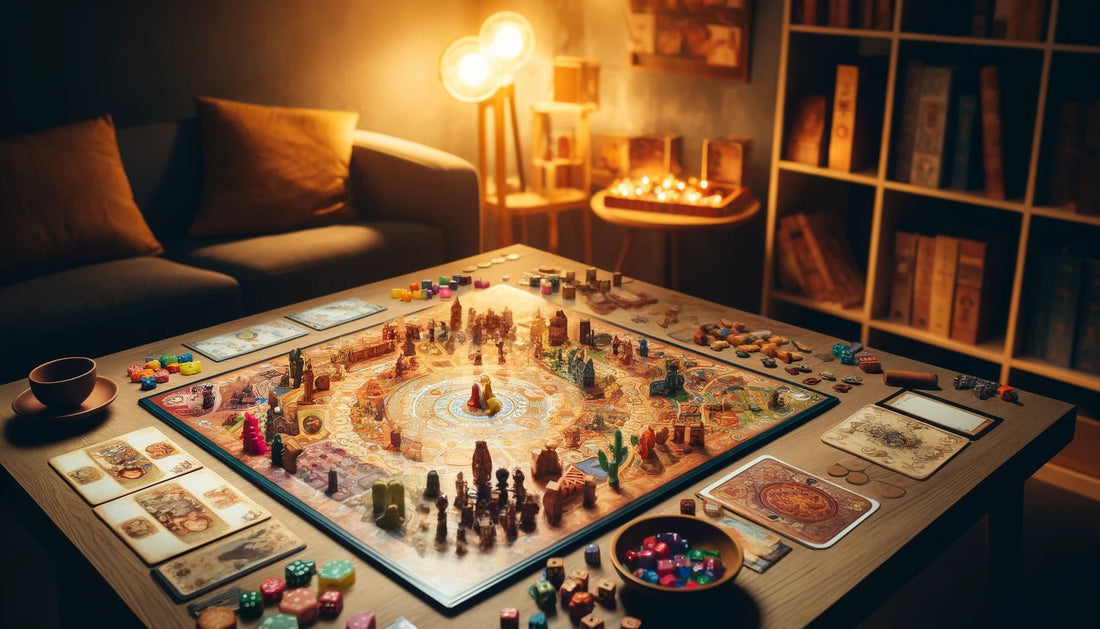
The Psychology of Board Games: Unveiling the Magic Behind Our Love for Play
Share
Once upon a time, in a world not so different from our own, there existed a realm of cardboard kingdoms, wooden warriors, and dice that held the fate of empires in their pips. This was the wondrous world of board games, a domain where imagination met strategy, and simple evenings turned into grand adventures. But what is it about these games that captures our hearts and minds so completely? To understand this, we must journey into the very psychology that fuels our love for these magical pastimes.
The Cognitive Symphony of Board Games
Imagine your mind as a grand orchestra, each neuron a musician playing in harmony. Board games are the maestros, conducting this cognitive symphony with precision. They challenge our brains, requiring us to plan, strategize, and make decisions, often under the pressure of a ticking clock or the looming presence of an opponent's next move.
Studies have shown that engaging in board games can enhance cognitive functions such as memory, problem-solving, and critical thinking. When we ponder our next move in chess or devise a winning strategy in Settlers of Catan, our brains are hard at work, creating new neural pathways and strengthening existing ones. This mental exercise is akin to a workout for our brains, keeping them sharp and agile.
But the cognitive benefits extend beyond mere brainpower. Board games also teach us patience, perseverance, and the ability to cope with setbacks. The sting of a lost game can be a valuable lesson in resilience, helping us to handle failure with grace and learn from our mistakes.
The Social Magic of the Game Table
Board games are not just solitary pursuits; they are bridges that connect us to others. Picture a round table, a game spread out, and friends and family gathered, their faces lit with excitement and anticipation. This is the social magic of board games, where bonds are strengthened, and memories are made.
Human beings are inherently social creatures, and our interactions with others are crucial for our well-being. Board games provide a structured yet flexible environment for socialization, where rules guide our behavior, and shared goals foster cooperation. Whether it's working together to solve a mystery in Clue or outwitting opponents in Risk, these interactions promote communication, teamwork, and empathy.
Moreover, board games can break down social barriers, allowing people of different ages, backgrounds, and personalities to come together. In the microcosm of the game table, everyone is equal, united by the common objective of fun and engagement. This inclusivity is particularly beneficial for children, teaching them valuable social skills and helping them build friendships.
The Emotional Enchantment of Play
Beyond the cognitive and social dimensions lies the emotional core of our love for board games. At their heart, these games are sources of joy, excitement, and sometimes, a little bit of friendly rivalry. They provide a safe space for emotional expression, where laughter, surprise, and even frustration can be shared openly.
Playing board games can be a form of escapism, a way to step out of the mundane and into a world of fantasy and adventure. This emotional engagement is not just about fun; it's also a means of stress relief. The immersive nature of board games allows us to disconnect from our worries and immerse ourselves in the present moment, fostering mindfulness and relaxation.
Furthermore, the narrative element of many board games adds to their emotional appeal. Games like Dungeons & Dragons or Gloomhaven weave intricate stories that players become a part of, creating a sense of ownership and investment in the outcome. This storytelling aspect taps into our innate love for narratives, making the gaming experience deeply satisfying on an emotional level.
The Evolutionary Roots of Play
To fully understand why we love board games, we must look back to our evolutionary past. Play is a fundamental aspect of human development, seen in children and adults alike. It serves as a training ground for real-life skills, from problem-solving to social interaction.
In ancient times, play was a way to practice survival skills in a safe environment. Today, board games continue this tradition, offering a microcosm of life's challenges and rewards. They allow us to experiment with different strategies, take risks, and experience the thrill of victory or the lessons of defeat, all within the confines of a game.
The Future of Board Games
As we look to the future, the world of board games is evolving, incorporating technology and innovation to create even more engaging experiences. Digital board games, augmented reality, and online multiplayer platforms are expanding the possibilities, making it easier than ever to connect with fellow gamers around the globe.
Yet, despite these advancements, the core essence of board games remains unchanged. They continue to be a source of joy, connection, and mental stimulation, reminding us of the simple pleasures of gathering around a table and sharing an adventure.
Conclusion
In the end, the magic of board games lies in their ability to bring people together, challenge our minds, and provide a gateway to worlds of imagination. They are more than just games; they are a testament to the enduring power of play in our lives. So, the next time you sit down to a game, remember that you are not just moving pieces on a board, but embarking on a journey of cognitive, social, and emotional discovery. Happy gaming!
